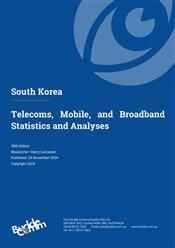South Korea Telecoms Market Report
Telecoms, Mobile and Broadband - Statistics and Analyses

Publication Date: April 2024
Report Pages: 143
Analyst: Sebastien De Rosbo
South Korea drives up its 5G adoption and data usage
South Korea is second only to Hong Kong in the world rankings of telecom market maturity. It enjoys a highly competitive but stable market, with strong central government support that helps drive the rollout of advanced infrastructure in both the fixed and mobile arenas. South Korea is also on the leading edge of the latest telecom technology developments, including around 6G. And it is host to two of the world’s top equipment manufacturers in the form of Samsung and LG.
With its highly urbanised, tech-savvy population, South Korea also enjoys very high penetration levels across all segments – fixed-line telephony (44% at the start of 2022), fixed broadband (46%), mobile voice and data (144%), and mobile broadband (120%). The performance of the mobile sector is on a par with other developed markets around the region, but it’s the wireline segment that allows South Korea to stand out from the crowd. This is partly a reflection of the large proportion of its population who live in apartment buildings (around 60%), making fibre and apartment LAN connections relatively easy and cost-effective to deploy. The government’s Ultra Broadband convergence Network (UBcN) had aimed to reach 50% adoption by the end of 2022, but that target may be a few more years away. Still, the country already has one of the world’s highest fixed broadband rates.
Fixed-line teledensity is also at a very high level compared to most of the rest of the world, but it has been on a sharp decline from a penetration rate of 60% ten years ago. That fall has forced the incumbent telco KT Corp to diversify into other telecom segments (including investments in 5G and the development of 6G) as well as non-telecom sectors (such as autonomous vehicles) in an effort to transform itself into a digital platform company. However, a major network outage in October 2021 drew the ire of the government and the police (in addition to the consumers and businesses directly affected by the shutdown), suggesting that the company may need to refocus its attention back on its core business.
On the mobile front, users have enthusiastically migrated from one generation of mobile platform to the next as each iteration becomes available. There also doesn’t appear to be any great concern about there being a lack of demand for 5G in South Korea (when the country is already well supported by 4G networks), with 30% of all subscribers having already made the switch. Part of the reason behind the rapid transition may be the subsidised handsets on offer from each of the MNOs and the MVNOs – a practice that has become so widespread and cutthroat that the regulators has regularly stepped in and fined the operators billions of won for breaching the subsidy level and risking a price war that will ultimately damage the entire industry.
This report update includes regulator and operator data to February 2022; Telecom Maturity Index charts and analyses; and other recent market developments.
Key Developments
- 5G adoption reaches more than 30%.
- Customers on 5G use twice as much data as those on 4G in total despite having less than half the number of subscribers.
- South Korean government cancels a planned auction of additional 5G spectrum in the 3.4-3.42GHz range following complaints of unfair process.
Key companies mentioned in this report:
KT Corp, SK Telecom, LG U+, SK Broadband.
Related Reports
- 2019 Asia - Mobile Network Operators and MVNOs
- 2019 Asia - Fixed Broadband Market - Statistics and Analyses
- 2019 Asia - Mobile Infrastructure and Mobile Broadband
- Azerbaijan - Telecoms, Mobile and Broadband - Statistics and Analyses
- North Korea - Telecoms, Mobile and Broadband - Statistics and Analyses
- Thailand - Telecoms, Mobile and Broadband - Statistics and Analyses
- Afghanistan - Telecoms, Mobile and Broadband - Statistics and Analyses
- Macau - Telecoms, Mobile and Broadband - Statistics and Analyses
- Kyrgyzstan - Telecoms, Mobile and Broadband - Statistics and Analyses
- Laos - Telecoms, Mobile and Broadband - Statistics and Analyses
Share this Report
TMT Intelligence
A platform to scale your intelligence tasks
Monitor critical insights with our AI-powered Market Intelligence Platform gathering and analyzing intelligence in real time. With AI trained to spot emerging trends and detect new strategic opportunities, our clients use TMT Intelligence to accelerate their growth.
If you want to know more about it, please see:
Research Methodology
BuddeComm's strategic business reports contain a combination of both primary and secondary research statistics, analyses written by our senior analysts supported by a network of experts, industry contacts and researchers from around the world as well as our own scenario forecasts.
For more details, please see:
More than 4,000 customers from 140 countries utilise BuddeComm Research
Are you interested in BuddeComm's Custom Research Service?
Hot Topics
News & Views
Have the latest telecommunications industry news delivered to your inbox by subscribing to BuddeComm's weekly newsletter.